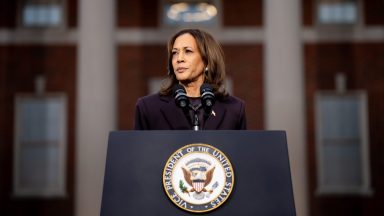
Kamala Harris: Can She Run for President Again?

Kamala Harris has officially conceded to President-elect Donald Trump, marking a significant moment in the 2024 election cycle.
On Wednesday, during a heartfelt address at Howard University, her alma mater, the Vice President acknowledged the election results. She stated, “I do not concede the fight that fueled this campaign,” emphasizing her commitment to the causes she champions.
“The fight for freedom, for opportunity, for fairness, and the dignity of all people. A fight for the ideals at the heart of our nation, the ideals that reflect America at our best. That is a fight I will never give up,” she passionately declared, reinforcing her dedication to social justice and equality.
As we reflect on the implications of this election outcome, it’s essential to explore how presidential terms function and the possibility of whether the Vice President might pursue another presidential candidacy in the future.
Exploring the Possibility of Kamala Harris Running for President Again
In American politics, there are no restrictions on the number of times an individual can run for the presidency. Therefore, if she chooses to, Kamala Harris can absolutely mount another campaign in future elections.
Historically, the U.S. has seen numerous candidates who have repeatedly sought the presidency. For instance, Harold Stassen, a former governor of Minnesota, notoriously ran for president nine times as a Republican from 1944 to 1992. Similarly, Lyndon LaRouche made his bid in eight consecutive elections from 1976 to 2004, initially as a candidate for the U.S. Labor Party that he founded, and subsequently for the Democratic Party.
Speculating on Kamala Harris’s Potential Presidential Run in 2028
Following Harris’ concession speech, speculation has arisen regarding her future political aspirations, particularly whether she will run under more favorable conditions in 2028. While some analysts suggest that it may be unlikely for her to pursue the presidency again, there is also the possibility that she could step away from public office altogether.
Harris embarked on a 107-day campaign under extraordinary circumstances after President Joe Biden withdrew from the race, quickly capturing significant support. By October, her campaign team had impressively raised $1 billion. Yet, challenges arose in expanding her appeal beyond her core base, which at times, struggled to demonstrate robust support across the electorate.
Understanding Donald Trump’s Eligibility for a 2028 Presidential Run
The 22nd Amendment of the U.S. Constitution imposes a limit on presidential terms, restricting individuals to a maximum of two terms in office, including any non-consecutive terms. Therefore, the next four years will represent the final opportunity for Trump to occupy the nation’s highest office again.
Given the Republican Party’s ambitions to regain control of both the House and Senate, there are valid concerns about Trump potentially overstepping his powers—echoing his controversial actions during the January 6 Capitol insurrection, raising questions about the future of American democracy and governance.


